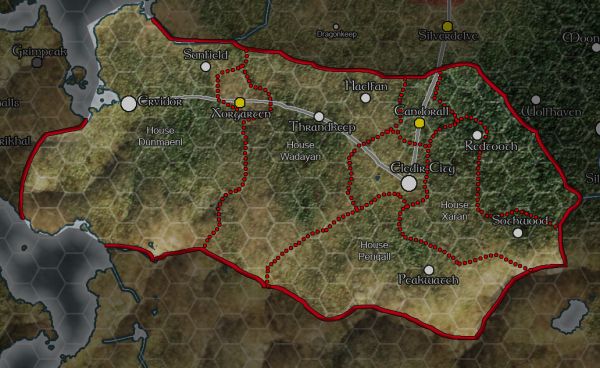Old Houses of Tamous
The four Houses of Tamous - once five, before the exile of House Gwiseth three hundred years ago - are families of particularly ancient lineage. Their blood have produced knights, priests and wizards of no small skill over the years, and they are direct leaders for the people of Tamous.
Each House has a massive estate just outside of Eledir City. This is the House's seat, and where its lord and heir are required to make their residences at least half the weeks of a year. Though they are opulent estates, the nobility understand that these estates are elaborate hostage holdings: they are guarded exclusively by the soldiers of House Ylrannin, after all, and more than once House Ylrannin has used that leverage to ensure that a House bubbling on the edge of rebellion changes its mind.
Outside of Eledir City's orbit, however, the Houses of Tamous wield tremendous power. The nation is effectively sliced up among them, with portions of it here and there shifting between one House and the next as the Emperor shows his favor and disfavor by giving lands with one hand, and taking them from another House with the other.
The Houses
- House Dunmæril: One of the oldest Houses, and the first kings of Tamous, the Dunmærils sided with Ylrannin to overthrow House Gwiseth, who are now outcast. Still strong allies to House Ylrannin.
- House Wadayan: A wealthy House with ties to the Guilds, known as cunning investors.
- House Xaran: Youngest of the Houses, founded after the Shifter Wars of 816, founded by a Tamousan general raised to nobility for his wartime efforts. Given lands taken from the shifters.
- House Periqall: A minor, somewhat frontier House, with lands the furthest from most civilized areas.
Marriage Traditions
One of the privileges of nobility is that its lords (any of the men of noble blood, not just those who rule the House) may marry multiple spouses. The primary wife is called the Name-wife, and she acts as his spouse in terms of lineage and running the House as a whole. She is also considered higher in station than his other spouses, who are called "holdwives" (or "holdmen" in the case of male hold-spouses). The term comes from the days when a lord might keep a different spouse at each of his holdings, but that is an uncommon arrangement in these days.
Any child born to a holdwife may be acknowledged by the lord, but failing that, they simply remain as retainers to the House, or go on to serve in knightly orders sponsored by their father's House. While once this put pressure on a Name-wife to produce legitimate heirs, in modern Tamous, it often means the opposite - the Name-wife worries little about children if she is disinclined towards them, and expects her husband to simply weed through "the best" of his hold-gotten children (or "hold-get" in the vulgar slang of the day) and acknowledge children he likes, leaving her to pursue the affairs of the House and her own interests. A holdspouse is required by law to maintain fidelitous relationships with their lord, although it is both common and legal for holdspouses to act as one anothers' lovers, so long as no children are produced from the union.
The Name-wife is herself entitled by law to lovers and paramours as well - a benefit that befits her station - but these must either be women or men rendered infertile by what is called "partial castration" (a procedure by which the tubes connecting the testes to the rest of the reproductive system are severed, but otherwise remain intact). This surgical procedure was once considered unmanning, but is relatively common in this age among the nobility, particularly for sons who know they have no lands to inherit. Such young men are the only socially appropriate lovers a married woman may take. The slang term for both the state of having had such a surgery, and for those men who have it is "sweet-scar" - as in, "it is sweet to a lady of worth to see such a scar on her paramour."
It is worth noting that these complex relationships - often referred to as "constellations" - are considered a privilege of the nobility. Though the lower classes sometimes mimic their betters by taking lovers (often with the permission or even encouragement of their spouses), such relationships are personal only, having no social standing or legal interconnections.
Dowager Ladies & the House of Winter Flowers
Name-wives who outlive their husbands are referred to as "Dowager Ladies." Though such women may remain in their House's estates if they please or are of ill health, the majority do not. Instead, once their husbands are properly interred, they usually travel to the capital city, stopping in small settlements along the way to give coin to the poor in their dead husbands' names. When they reach Eledir City, usually resplendent in their mourning finery, they go immediately to the House of Winter Flowers, a grand palace that once served as the estate for House Gwiseth.
The House of Winter Flowers is home to the Parliament of Dowagers, a legal body made up of the Dowager Ladies of Tamous, who are required by law to be consulted in the passing or altering of any new laws made by the Throne. This is the only direct feedback the Houses have in terms of advising in the governance of the nation, so the role of the Dowager Ladies is one of tremendous importance - the irony of a "mere wife's" role being of more importance once her husband has died than her husband's was when he lived has not escaped the notice of those outside of Tamous, either. Unkind minstrels sing songs of the henpecked master of Tamous, and his "garden of wilted flowers." Such gleemen know better than to sing such songs in Tamous, however.
